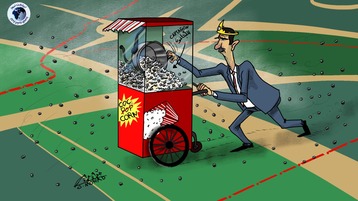-
Iran’s crumbling economy: Rising unemployment, declining per capita income, and poverty.

Per capita income and Gini index are 2 criteria that represent the income and income inequality or wealth inequality within a nation or a group of people in a society. According to available statistics, per capita income (PCI) or average income of Iranian households has been declining instead of increasing over time.
On top of that according to the head of the Iranian Chamber of Commerce, during the four decades after the revolution, the country’s economy had single-digit inflation for only four years and double-digit inflation for the rest of the years, which means higher prices, reduced purchasing power and loss of livelihood. This is primarily due to the regime’s erroneous economic policies, which are the result of incompetence and corruption in all the ruling institutions.
After the withdrawal of the United States from the Joint Comprehensive Plan of Action (JCPOA), international companies left Iran and oil exports reached the lowest possible level. To compensate for the budget deficit caused by the reduction in oil exports, the Iranian regime manipulated the foreign exchange rate, borrowed from the central bank, sold state-owned companies and factories, and swayed the stock market, and has recently started extracting bitcoins. All these measures are what observers call the “wrong policies” and the “mismanagement of the economy” which “has exacerbated the stagflation in recent years.”
Ishaq Jahangiri, Iran’s First Vice President, said on January 24 during a visit to an oil, gas and petrochemical exhibition that “sanctions have reduced Iran’s revenue by about $100 billion.”
“If it were not for sanctions, $100 billion would have been invested in the country, increasing per capita income and reducing poverty.”
The regime has always blamed the US for all its economic failures despite its systematic corruption. However, even before sanctions, Iran was suffering from a crumbling economy. Many believe that sanctions have not played a major role in the declining trend of the Iranian economy. The main problem is neither sanctions nor investment; the problem is institutionalized corruption and mismanagement.
Systematic corruption is the pseudonym of the Iranian regime. As long as this regime exists, corruption will exist. And as Javad Mansouri, regime elite and former IRGC commander famously said in 2013, “even if gold fell from the sky” nothing will change.
During the eight-year administration of former Iran President Ahmadinejad, Iran earned more than $100 billion from oil sales. But most of that money went to the regime’s belligerence in the region, its covert atomic bomb program, missile program expansion, and into the pockets of officials and elites, not to the people or in investments and development.
According to the head of the Tehran Chamber of Commerce, “from 2012 to 2020, about $90 billion of capital was taken out of the country.”
“The inflation index has always been in double digits for more than four decades, except for four years, and Iran is among the nine countries with double-digit inflation in the world,” Massoud Khansari added in a parliamentary meeting said.
According to the Tehran Chamber of Commerce, liquidity has increased from 354 trillion tomans in 2012, to 3,130 trillion tomans in the first nine months of this (Persian) year. An amount that threatens the economy like a destructive avalanche. This index has experienced an average annual negative growth of 5%.
According to the Parliamentary Research Center, while Iran’s national per capita income was 5,760 million tomans in 2005, it is now 4,740 million tomans putting 35% of the population, or nearly four lower income groups of the population, below the line of poverty.
Two years ago, the government more than tripled the official exchange rate for the dollar. This policy increased the dollar exchange rate in the open market and the value of each dollar surged to 32,000 tomans.
The rising dollar exchange rate, in turn, has made essential consumer goods more expensive and has caused loss of livelihood. Even government agencies are reporting a reduction in protein consumption in low-income households adding that some families no longer eat meat and fruit.
In the past year, the coronavirus epidemic has also intensified the recession and inflation in Iran at the same time. Although the Statistics Center of Iran has falsely reported a decrease in unemployment, the estimates of the Parliament’s Research Center indicate an increase in unemployment which is now officially at 24.5%. The real figure, however, is much higher.
In the last three years, Iran has experienced economic growth of negative 5% and inflation above 30%, which is the highest and longest inflationary recession in the economic history of Iran.
The Statistics Center of Iran announced the official inflation rate as 44.7% in November 2020. The inflation rate for foodstuffs is 59%.
Khansari, who is also the Vice President of the Iranian Chamber of Commerce and Industry, cited the government’s six-year budget deficit and said “during the first nine months of this (Persian) year, 83% of the assignment of securities, equivalent to 120,000 billion tomans, has been used on government expenditures and the rest has been given to corporations”. He said this would add to government debt in the coming year.
Khan sari also noted the declining trend of real investment in the country from 2005 to 2019. According to the Head of the Tehran Chamber of Commerce, investment in the country in 2020 was equal to 98,000 billion tomans, which is the lowest figure in the last 15 years. He also cited the average annual negative growth of 6% for private sector investments from 2012 to 2019.
Khansari also pointed out the growth trend of available capital in the country. According to him, in 2019, the depreciation of capital exceeded the amount of investment and for the first time in Iran, the growth of capital was negative. Khansari said Iran had also failed to attract foreign investment adding that the lowest rate of direct foreign investment in Iran was recorded in 2019. Clearly, Iran’s economy has shrunk, poverty has risen, and living standards have fallen. Investment and trade, which are the main drivers for economic growth, have reached their lowest levels, the outflow of capital from the country has increased, and interaction with the global economy has also reached a minimum. Lack of economic stability, dual exchange rate, inflation and recession, lack of a clear picture of the current state of the economy and an ambiguous political future coupled with political instability, uncertainty in economic affairs, and an unfavorable business environment are some of the challenges that the Iranian economy faces. Current conditions have led to public discontent. Most Iranians no longer trust regime leaders and hold daily protests to express their economic grievances.

Cyrus Yaqubi is a Research Analyst and Iranian Foreign Affairs Commentator investigating the economy of the middle east countries that are relying on the oil revenue and comparing their progress to their ruling system, specially covering a variety of topics about Iran.
Tags
You May Also Like
Popular Posts
Caricature
BENEFIT Sponsors BuildHer...
- April 23, 2025
BENEFIT, the Kingdom’s innovator and leading company in Fintech and electronic financial transactions service, has sponsored the BuildHer CityHack 2025 Hackathon, a two-day event spearheaded by the College of Engineering and Technology at the Royal University for Women (RUW).
Aimed at secondary school students, the event brought together a distinguished group of academic professionals and technology experts to mentor and inspire young participants.
More than 100 high school students from across the Kingdom of Bahrain took part in the hackathon, which featured an intensive programme of training workshops and hands-on sessions. These activities were tailored to enhance participants’ critical thinking, collaborative problem-solving, and team-building capabilities, while also encouraging the development of practical and sustainable solutions to contemporary challenges using modern technological tools.
BENEFIT’s Chief Executive Mr. Abdulwahed AlJanahi, commented: “Our support for this educational hackathon reflects our long-term strategic vision to nurture the talents of emerging national youth and empower the next generation of accomplished female leaders in technology. By fostering creativity and innovation, we aim to contribute meaningfully to Bahrain’s comprehensive development goals and align with the aspirations outlined in the Kingdom’s Vision 2030—an ambition in which BENEFIT plays a central role.”
Professor Riyadh Yousif Hamzah, President of the Royal University for Women, commented: “This initiative reflects our commitment to advancing women in STEM fields. We're cultivating a generation of creative, solution-driven female leaders who will drive national development. Our partnership with BENEFIT exemplifies the powerful synergy between academia and private sector in supporting educational innovation.”
Hanan Abdulla Hasan, Senior Manager, PR & Communication at BENEFIT, said: “We are honoured to collaborate with RUW in supporting this remarkable technology-focused event. It highlights our commitment to social responsibility, and our ongoing efforts to enhance the digital and innovation capabilities of young Bahraini women and foster their ability to harness technological tools in the service of a smarter, more sustainable future.”
For his part, Dr. Humam ElAgha, Acting Dean of the College of Engineering and Technology at the University, said: “BuildHer CityHack 2025 embodies our hands-on approach to education. By tackling real-world problems through creative thinking and sustainable solutions, we're preparing women to thrive in the knowledge economy – a cornerstone of the University's vision.”
opinion
Report
ads
Newsletter
Subscribe to our mailing list to get the new updates!






















